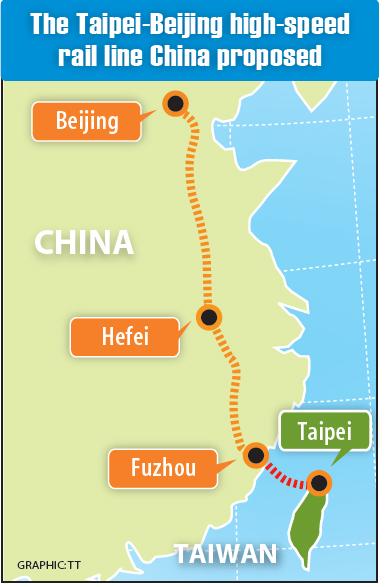China’s Association for Relations Across the Taiwan Straits (ARATS) Chairman Chen Deming (陳德銘) said that Taiwan and China need to work out political issues before talks can start regarding a high-speed rail connection between Taipei and Beijing, adding that the project would require a lot of patience and negotiations.
“Taiwan could experience power shortage problems over the next few years, and both Taiwan and China can discuss how to resolve the problem. China has the skills and technology to build long-span bridges, on which the high-speed system could operate. We are also able to build underground sections,” Chen said, adding that funding for the project would not be a problem either.
Chen said that Taiwan has shown strength in the construction of its own high-speed rail system.

Should the two sides cooperate, the problems of power and utility supplies could be easily resolved, he said.
“There remains a problem of political inclination between us [Taiwan and China], a problem involving the inclinations of the two parties that are in the stage of peaceful development,” Chen said. “We must wait and see and further discuss this matter with patience.”
China listed a “Beijing-Taipei high-speed rail corridor” as part of its five-year plan to be accomplished by 2020 at the Chinese National People’s Congress, which opened on Saturday.
Chen made the remarks at an interview with the media before attending a task force meeting.
When asked whether the railway plan demonstrates China’s ambition to unify with Taiwan, Chen said that he did not think the project was related to the issue, but added that the two sides are “one family.”
Based on Beijing’s plan, the rail corridor would include four major sections, between Beijing and Bengbu, Anhui Province; between Bengbu and Hefei in Auhui; between Hefei and Fuzhou in China’s Fujian Province; and between Fuzhou and Taipei.
The tracks between Beijing and Bengbu would be part of the Beijing-Shanghai High Speed Railway, which has been in operation since June 30, 2011. The lines connecting Bengbu and Hefei and Hefei and Fuzhou were launched in Oct. 16, 2012, and June 28 last year respectively.
China has begun work on a line connecting Fuzhou and Pingtan Island in its Fujian Province, which is about 100km from Taipei. Pingtan Island was designated a national development zone by the Chinese government in 2009.
To connect Pingtan to Taiwan, China has proposed building an undersea tunnel in the Taiwan Strait.
The Mainland Affairs Council and the Ministry of Transportation and Communications had dismissed the unilaterally proposed plan, saying that the project involves many complicated issues ranging from technology and operations to national security.

The US government has signed defense cooperation agreements with Japan and the Philippines to boost the deterrence capabilities of countries in the first island chain, a report by the National Security Bureau (NSB) showed. The main countries on the first island chain include the two nations and Taiwan. The bureau is to present the report at a meeting of the legislature’s Foreign Affairs and National Defense Committee tomorrow. The US military has deployed Typhon missile systems to Japan’s Yamaguchi Prefecture and Zambales province in the Philippines during their joint military exercises. It has also installed NMESIS anti-ship systems in Japan’s Okinawa

‘WIN-WIN’: The Philippines, and central and eastern European countries are important potential drone cooperation partners, Minister of Foreign Affairs Lin Chia-lung said Minister of Foreign Affairs Lin Chia-lung (林佳龍) in an interview published yesterday confirmed that there are joint ventures between Taiwan and Poland in the drone industry. Lin made the remark in an exclusive interview with the Chinese-language Liberty Times (the Taipei Times’ sister paper). The government-backed Taiwan Excellence Drone International Business Opportunities Alliance and the Polish Chamber of Unmanned Systems on Wednesday last week signed a memorandum of understanding in Poland to develop a “non-China” supply chain for drones and work together on key technologies. Asked if Taiwan prioritized Poland among central and eastern European countries in drone collaboration, Lin

Renewed border fighting between Thailand and Cambodia showed no signs of abating yesterday, leaving hundreds of thousands of displaced people in both countries living in strained conditions as more flooded into temporary shelters. Reporters on the Thai side of the border heard sounds of outgoing, indirect fire yesterday. About 400,000 people have been evacuated from affected areas in Thailand and about 700 schools closed while fighting was ongoing in four border provinces, said Thai Rear Admiral Surasant Kongsiri, a spokesman for the military. Cambodia evacuated more than 127,000 villagers and closed hundreds of schools, the Thai Ministry of Defense said. Thailand’s military announced that

CABINET APPROVAL: People seeking assisted reproduction must be assessed to determine whether they would be adequate parents, the planned changes say Proposed amendments to the Assisted Reproduction Act (人工生殖法) advanced yesterday by the Executive Yuan would grant married lesbian couples and single women access to legal assisted reproductive services. The proposed revisions are “based on the fundamental principle of respecting women’s reproductive autonomy,” Cabinet spokesperson Michelle Lee (李慧芝) quoted Vice Premier Cheng Li-chiun (鄭麗君), who presided over a Cabinet meeting earlier yesterday, as saying at the briefing. The draft amendment would be submitted to the legislature for review. The Ministry of Health and Welfare, which proposed the amendments, said that experts on children’s rights, gender equality, law and medicine attended cross-disciplinary meetings, adding that